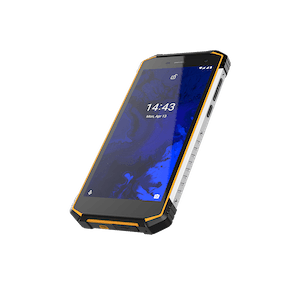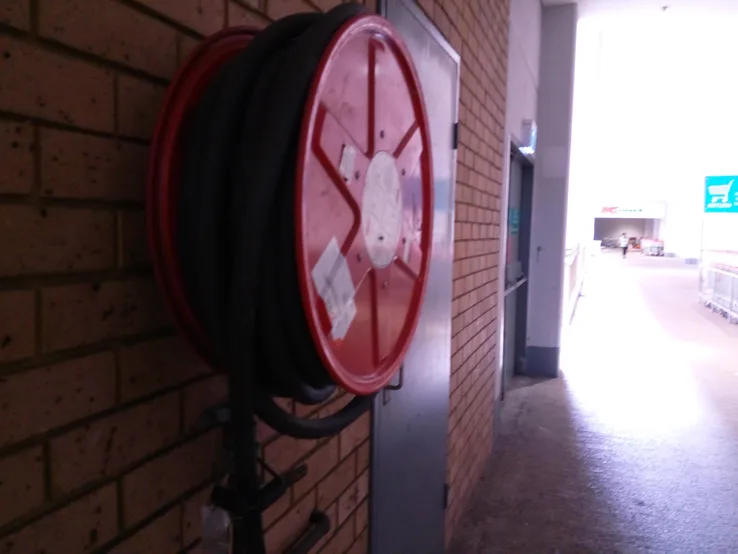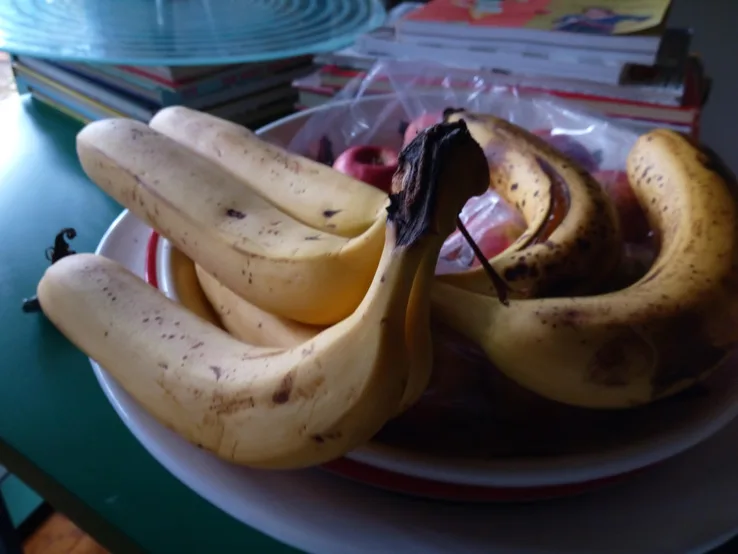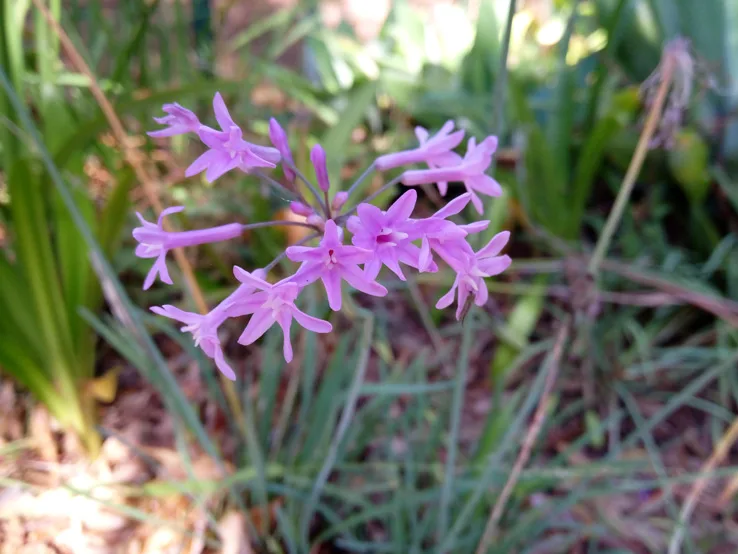Aspera R9 review: Low-cost, tough tradie phone
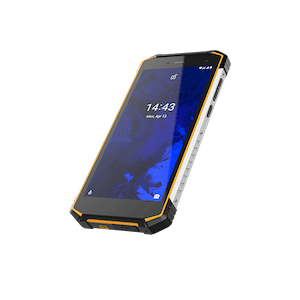
-
- Battery Score
4
- Camera Score
2
- Design Score
4
- Performance Score
2
- Battery Score
4
Summary
Quick verdict: It’s not particularly powerful or equipped with a fancy camera, but if you want a low-cost Android handset with some reasonable durability, there’s value to be found in Aspera’s latest phone.
- IP-rated water resistance
- Shock resistance
- Good battery life
- Low-level performance
- Poor camera
- Big phone, but small display
Details
Pricing & Availability
| RRP | $279 |
| Launch date | 2021-01 |
Aspera's phone offerings to date have all focused solidly on the value segment of the smartphone space, whether you're talking affordable Android offerings like the Aspera AS6 or even simpler feature phones like the Aspera F42.
The Aspera R9 is quite different, with a strong focus on being, well, strong.
It's a toughened phone with water, dust and shock resistance, something you don't typically find in phones at that price point.
That does make it a real niche product, because while many of us do accidentally damage our phones over time, very few low-cost phones go heavily into heavy duty resistance features.
That marks the Aspera R9 as a tradie phone, similar to the Nokia 800 Tough – but not a feature phone – and cheaper than the Telstra Tough Max 3.
However, it's otherwise not a fancy device in any real way, so it's going to be best suited to those who need durability above and beyond any other factor.
Design
Design
- 5.45-inch display
- Bulky and heavy
- Tempered glass, but how tough is it?
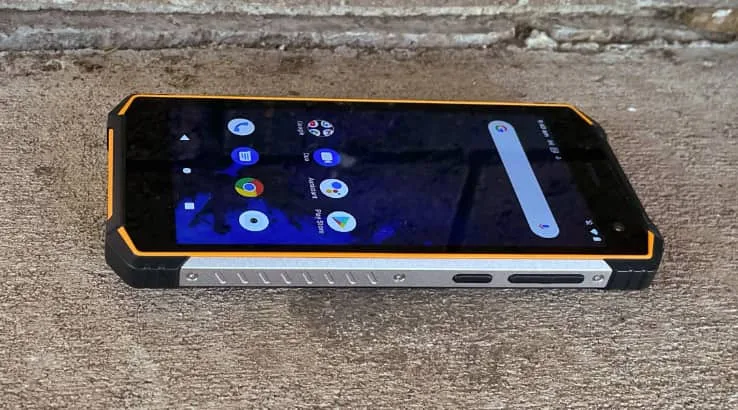
If you've ever seen any really heavy duty protective cases for flagship phones, the Aspera R9 might look at least a little bit familiar. That's because it wraps a phone body inside a ruggedised case design, which certainly makes it feel like a robust phone.
The downside there is that for a phone with only a 5.45-inch display, the Aspera R9 is very bulky and quite heavy. It measures in at 161x77x14mm with a carrying weight of 215 grams.
To put that into a degree of context, Samsung's flagship Galaxy S21 Ultra 5G measures in at 165.1x75.6x8.9mm and 227 grams, a little heavier and a whole lot more expensive than the Aspera R9. However, that's a phone with a 6.8-inch display, quite a lot larger than the screen you're going to be staring at on the Aspera R9.
The Aspera R9 features rubberised flaps at the top and bottom of the phone for headphone and power jacks respectively, sealed to improve your level of water and dust resistance. You don't get a choice in terms of colour patterns, so you'd better like that heavy tool black and orange aesthetic.
The entire point of the Aspera R9 is toughness, and it's rated as IP69 for water and dust ingress – meaning that it should be good for protection against dust ingress and water jets – but the only technical detail that Aspera gives for the front display is that it features "tempered glass". It could be some of Corning's more advanced Gorilla glass, or not. You would presumably find out just how tough it is at the precise moment it shattered.
One missing feature on the Aspera R9 is any level of biometric hardware authentication. There's no onboard fingerprint sensor, either under the glass or on the power button or rear of the phone at all. You can opt for a face unlock, but this is only using a simple flat photo recognition algorithm, so it's not going to be particularly secure.
Camera
Camera
- Single front and rear cameras
- Slow focus and exposure issues
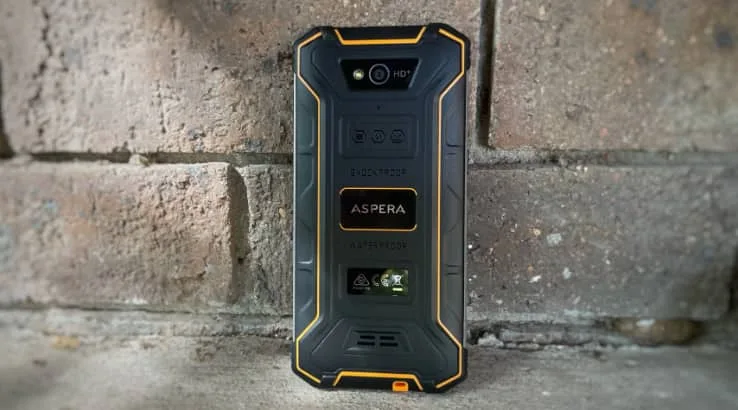
Aspera's phones have, to date, failed to particularly impress us when it's come time to shoot photos or video with them. That's somewhat been a factor of their very low price points, but even then we've seen some solid progression in budget phone cameras.
The Aspera R9 shows that the company is making progress in this respect, even if only a little. At the front, there's a 5MP selfie camera, while the rear houses a single 13MP sensor. That's not the most impressive you'll find in this price bracket by a wide margin, but it is better than we've seen on Aspera's other phones to date.
The end results are fairly predictable, however, and not great by way of comparison with many of the multi-lens phones available in the Aspera R9's price range. Shot focus is very slow to grab, and overexposure is a common problem for many daytime shots.
If you were using this in a tradie-style way it might be sufficient for taking simple photos of jobs, but not if the light is in any way compromised. Predictably it all goes downhill if you're in less than stellar conditions, and even then you'll need plenty of patience.
Performance
Performance
- Bullet points
- Slow processor leads to poor performance
- Quite durable
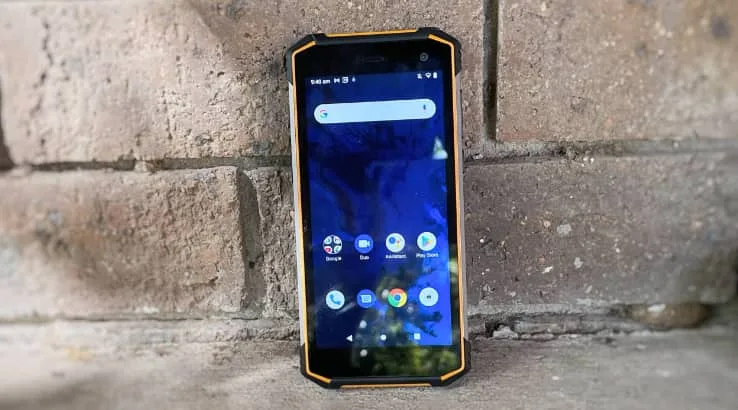
The Aspera R9 sells for the price that it does because while it's technically a very tough phone, once you crack open that shell and glance at the internal components, it all becomes very low grade.
The Aspera R9 is an Android 10 phone with minimal other installed software, but it's all running on a very low-grade MediaTek MT676 processor with just 3GB of RAM. While it's unreasonable to expect top-grade performance out of a budget phone, the practical reality is that you can get a lot better performance than the Aspera R9 is capable of offering.
That's reflected very sharply in benchmark results, where the Aspera R9 only just outdoes its sibling Aspera AS6, or even the much cheaper and older Telstra Essential 2 in both Geekbench 5's CPU test and 3DMark's Slingshot Extreme graphics test:
All of this adds up to a phone that can handle basic tasks, but only if you've got a reasonable quantity of patience. It ships with 32GB of onboard storage, but the realities of an Android 10 install mean that only around 23GB of it is actually accessible. You can expand that storage via microSD, but only up to a maximum of 128GB.
The other performance point for the Aspera R9 is its durability, and here I have very few complaints. I didn't have a stock of R9s to test to the point of destruction, but it survived more than a few games of "let's fling it down the stairs" without too many issues.
Again, I'd worry a little about the lack of detail surrounding its "tempered" glass, but then you really shouldn't be tempting fate with any phone, even one that's designed to be tough.
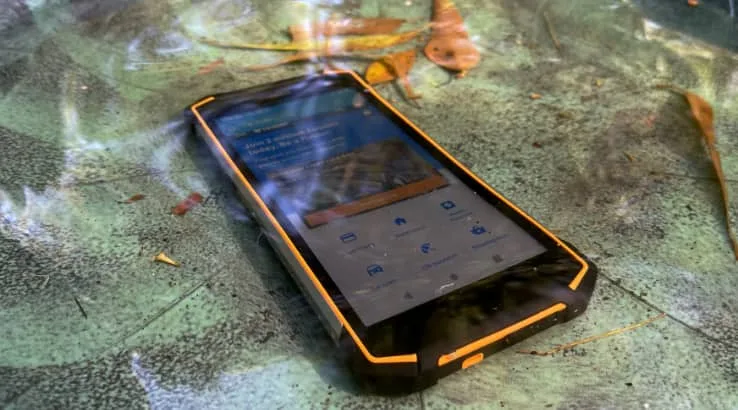
To test out its water endurance, I chucked the Aspera R9 into my birdbath for 20 minutes to see how it would fare.
By its IP69 rating it should be able to withstand that and 10 minutes more, but again I didn't want to tempt fate when I still had other tests to run on it. I can't say that the local birds were terribly keen on it, but that aside it managed to keep running happily through that ordeal, only needing a quick towelling off before I could use it again.
Battery life
Battery life
- 5,000mAh battery has good endurance
- Slow microUSB charging
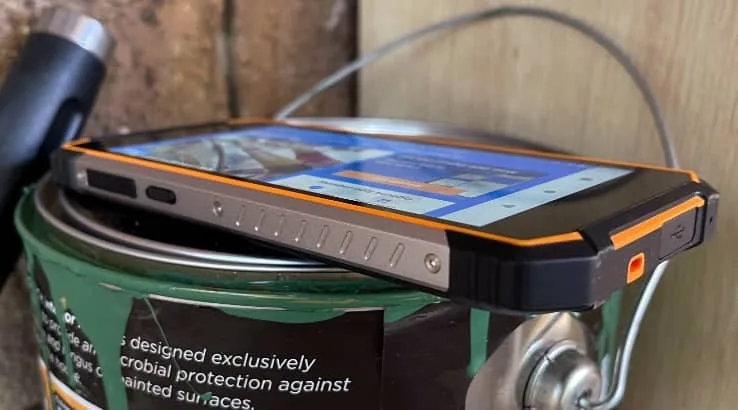
If there's been one point of consistency with Aspera's phones, it's been battery life. Every single Aspera smartphone we've tested to date has fallen short of our expected battery benchmark life for a day's usage, and in some cases by a wide margin.
As such, my expectations for the Aspera R9 weren't particularly high. The Aspera R9 uses microUSB charging, another strike against it in a market where we are starting to see a shift towards USB C even at these price points. However, in its favour is the inclusion of a 5,000mAh sealed battery, larger than in any previous Aspera phone.
The one upside to running an older and slower Mediatek processor is that you're not going to chew through as much power. To test this, I ran the Aspera R9 through our standard battery benchmark testing, streaming a YouTube video at maximum resolution with full brightness and moderate volume for an hour.
Our typical pass mark here is for a fully charged phone to have at least 90% of its battery capacity remaining, because that's a good indicator of a phone that should be able to last for at least a day's usage.
Here's how the Aspera R9 compares against similarly priced phones, as well as its brand stablemates:
That battery life figure for the Aspera R9, while not being top of the class, is very good by the measure of our usual brand expectations. The slowness of using the Aspera R9 would somewhat force you to use it sparingly in most cases, but for most busy users a day's usage is totally achievable.
Should you buy the Aspera R9?
- Buy it if you need a tough phone on a tight budget.
- Don't buy it if you need performance from your phone.
The Aspera R9 does one thing well, and that's staying alive, both in the durability and battery life stakes.
However, that's the only thing it does well and that means it's really only suitable for smartphone users who only need the most basic of functions to work and need durability as well.
There are faster toughened phones out there, but not many, and there are toughened cases that can add this kind of durability, but they're almost always only for phones with starting prices way north of $1,000.
The Aspera R9 isn't a great phone as a software proposition, but it's easily the best phone Aspera's produced so far, and at this price, it's a phone that does live up to its value proposition as long as tough is what you want out of a handset.
Pricing and availability
Images: Alex Kidman
More Finder reviews
-
Why I keep coming back to Google’s Pixel Watch 4 (you might disagree)
17 Dec 2025 |
-
The Pixel 10 is the perfect phone for everyday use – here’s why
16 Dec 2025 |
-
Apple iPhone 17 review – Is it the phone of the year?
16 Dec 2025 |
-
iPhone Air review – It’s not what I expected
12 Dec 2025 |
-
iPhone 17 Pro and Pro Max review – At their peak
30 Oct 2025 |
Sources
Your reviews
Alex Finder
Senior editor
You are about to post a question on finder.com.au:
- Do not enter personal information (eg. surname, phone number, bank details) as your question will be made public
- finder.com.au is a financial comparison and information service, not a bank or product provider
- We cannot provide you with personal advice or recommendations
- Your answer might already be waiting – check previous questions below to see if yours has already been asked
Finder only provides general advice and factual information, so consider your own circumstances, or seek advice before you decide to act on our content. By submitting a question, you're accepting our Terms Of Service and Finder Group Privacy & Cookies Policy.
This site is protected by reCAPTCHA and the Privacy Policy and Terms of Service apply.

